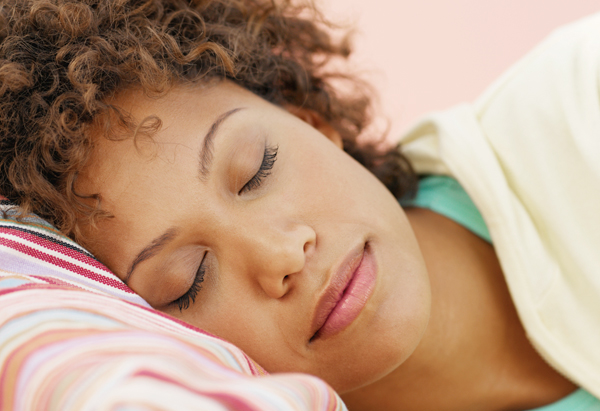In an excerpt from his book, The Source, Woodson Merrell, MD, explains how to get quality sleep quickly and easily.
 Good Bedding
Good BeddingA 2001 German study found that a medium-firm pillow significantly improved sleep (the firmest was of no advantage). Bottom line: A pillow should support your head, not bury it.
Pillows also frequently contribute to allergies that impair breathing. The source of allergens can be the filling (down allergies are common) or dust mites. I highly recommend getting a nonallergenic foam pillow and a dust-mite-blocking protector. You should toss your pillow into the dryer every few months to kill dust
mites and replace it every couple of years.
If you're in the market for a mattress, Consumer Reports found that people who spent 15 minutes testing a bed in the store—spending at least five minutes on each side, especially in their preferred sleeping position—were as satisfied as those who were allowed to take the beds home for a test sleep.
Light Therapy
By exposing sleep-deprived people to specially designed full-spectrum lights (10,000 lux fluorescent bulbs) for 30 minutes in the early morning, scientists have helped them get to sleep earlier and stay asleep longer. One theory is that regular exposure to such light in the morning triggers a more advantageous nighttime release of melatonin, the hormone that keeps your body clock on a regular schedule, ensuring that you feel sleepy in the evening and stay asleep through the night.
Light therapy can work wonders for people who find it difficult to fall asleep before midnight and are sluggish in the morning. For serious insomnia, it's best to work with a sleep specialist to devise a treatment program, which usually requires that you commit to waking up earlier each morning. But if you're suffering, it's worth a try.
Dark Therapy
Scientists studying the light-melatonin connection have discovered that the blue spectrum of light can disrupt circadian rhythms and keep you awake. Exposure to blue light late at night—it's emitted by computers, televisions, even digital clocks—can wreak havoc with your body clock. Keep your room pitch-dark at night, and cover all digital clock or DVD player readouts.
Behavioral Therapy
Here's the Catch-22: Obsessing about not getting enough sleep can stop you from getting enough sleep. This is so common that therapists have developed a protocol of behavioral modification that's been shown to work 70 to 80 percent of the time when this is the case.
The drill goes like this: Go to bed only when sleepy, and get up if you haven't fallen asleep in 20 minutes. Avoid nonsleep activities in bed (watching TV, eating, planning, or problem solving). Try to get up at the same time every morning. Don't get attached to unrealistic expectations of sleeping soundly every night, and try not to blame insomnia for any daytime problems. And don't catastrophize (imagine the bad things that will happen as a result of a poor night's sleep).
Acupuncture
Because research suggests that acupuncture helps balance neurotransmitters (elevating levels of the feel-good hormones called endorphins, for example), there's a logic for its use in promoting relaxation, which results in a better quality of sleep. In China acupuncture has been used successfully for thousands of years to treat sleep problems, though this effect has not been sufficiently studied in controlled trials in Western medicine. In my own practice, I use acupuncture as part of a comprehensive approach to insomnia.
And If Those Don't Work...
While lifestyle adjustments such as proper diet, exercise, and stress control are most important in improving sleep, nutritional supplements can provide a helpful nondrug transitional aid to improve sleep until you can make those changes. Just check with your doctor first.
Melatonin
It's the master hormone for regulation of the sleep cycle. Melatonin levels in the body rise just before you fall asleep and decline through the night, hitting a low point about two hours before you wake. (Melatonin is also a powerful antioxidant that enhances the reparative function of sleep.) Studies show that ingesting the hormone as a supplement can help reset the body clock, which is why it's used to alleviate jet lag. Melatonin can also gradually help insomniacs feel sleepy at an earlier hour: Take 1 to 3 milligrams two to three hours before the desired sleep time. Remember: While melatonin can help normalize sleep patterns, it is not a sleeping pill.
Valerian (Valeriana Officinalis)
A flowering plant, valerian is the closest you can get to an herbal sleeping pill—its sedative powers far outperform chamomile. Research suggests that components of valerian root affect enzyme systems that control neurotransmitter levels responsible for sleepiness. (Due to its sedative effect, valerian should not be taken before driving or operating machinery.) Try 400 to 600 milligrams an hour or two before bedtime.
L-Theanine
This amino acid, which you can find in most supplement stores, helps reduce tension and stress. I commonly recommend L-theanine in conjunction with other treatments for insomnia. Typical dosage is 300 milligrams a day.
oprah




0 comments:
Speak up your mind
Tell us what you're thinking... !